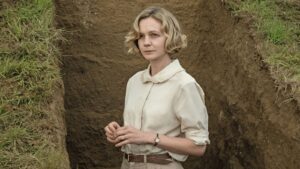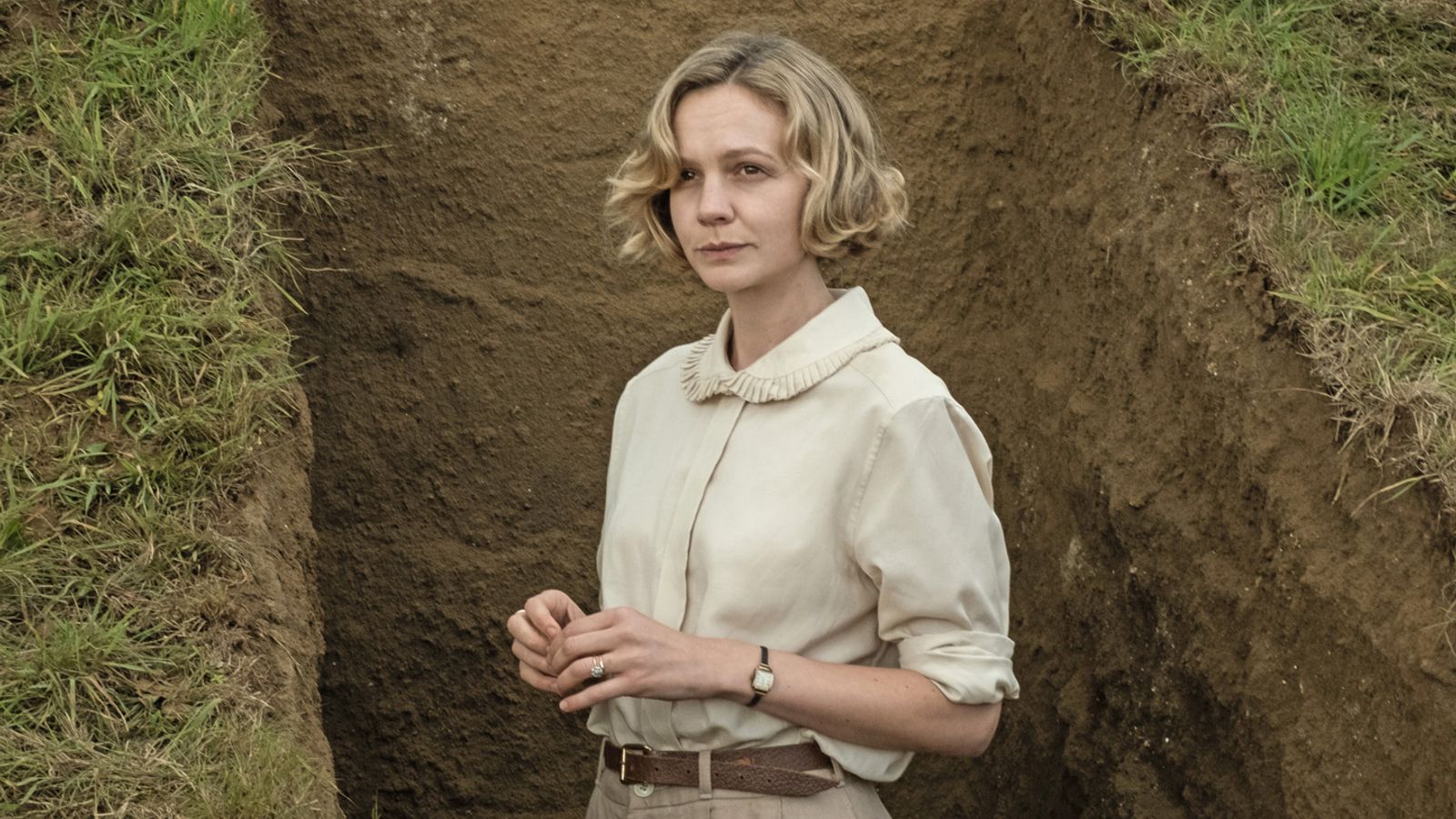How Carey Mulligan Got Into Acting
From Schoolgirl Dreams to Hollywood Stardom: The Journey of a Reluctant Star
(By Carmichael Phillip)

A Budding Passion: The Early Years
Carey Mulligan didn’t grow up in a household with deep connections to the entertainment world. Born on May 28, 1985, in Westminster, London, to a university lecturer mother and a hotel manager father, Mulligan’s upbringing was solidly middle class. Her family moved to Germany for her father’s work when she was just three, before eventually settling back in England.
Despite having no industry ties, Mulligan was drawn to performance from a young age. “I saw my brother in a school play, and I remember thinking, ‘That’s it. That’s what I want to do,'” she once recalled in an interview with The Guardian. As a child, she immersed herself in acting through school plays and community theater. Though shy, she found freedom and joy on stage.
Interestingly, it was a viewing of The Phantom of the Opera in the West End at age six that truly ignited her interest in acting. “I turned to my parents and said, ‘I want to be that girl on stage,'” Mulligan recounted. That simple moment would evolve into a lifelong ambition.
Challenging the Status Quo: Defying Traditional Paths
Mulligan’s journey wasn’t easy. Though she was passionate, she faced resistance early on. Her school discouraged dreams of acting in favor of more “practical” careers. At one point, a teacher told her, “You’re not pretty enough to be an actress. You should aim for something more realistic.” Those words could have crushed her spirit—but instead, they fueled her determination.
After finishing her schooling at Woldingham School, Mulligan applied to three drama schools and was rejected by all. Still, she remained undeterred. “It was crushing at first,” she told Vanity Fair, “but I knew I couldn’t quit. I just had to find another way in.”
In a bold move, Mulligan wrote a heartfelt letter to Julian Fellowes, the screenwriter of Gosford Park, after seeing him speak at a school event. She asked for advice and guidance on entering the profession without formal training or an agent. To her surprise, Fellowes and his wife responded warmly.
“Julian’s wife actually took me under her wing,” Mulligan said in an interview. “They introduced me to a casting director. It was through that connection that I got my first audition.”
A Breakthrough Performance: Pride & Prejudice
Mulligan’s big break came in 2005 when she was cast as Kitty Bennet in Joe Wright’s adaptation of Pride & Prejudice. It wasn’t a major role, but it put her on the map. Sharing screen time with Keira Knightley and Rosamund Pike, Mulligan’s performance was subtle, endearing, and noticeable.
“I was completely starstruck. I couldn’t believe I was on set with actors I’d admired for years,” she recalled in a BAFTA interview. “But I also realized, ‘I belong here.’”
Her role in Pride & Prejudice gave her the validation she needed. She now had credits, industry experience, and—most importantly—a belief in her own abilities. That same year, she began to appear in several British television dramas, including Bleak House, where her portrayal of Ada Clare drew praise from critics.
A Star is Born: An Education
The turning point in Mulligan’s career came in 2009 when she starred in An Education, a coming-of-age drama written by Nick Hornby. In the film, Mulligan played Jenny Mellor, a bright and ambitious schoolgirl seduced by an older man. The role earned her an Academy Award nomination for Best Actress and widespread acclaim.
“An Education changed everything,” Mulligan told The New York Times. “It was the first time I was really the lead. There was nowhere to hide. I had to carry the whole film.”
Critics lauded her performance for its complexity and emotional depth. Roger Ebert wrote, “Mulligan is a revelation. She shows us a teenager’s headlong plunge into adult life with fear, joy, and trembling.”
From then on, she was no longer a rising star—she was a certified talent.
Taking Control: Choosing Roles with Purpose
Mulligan quickly proved she wasn’t content to be just another Hollywood actress. Rather than chase blockbusters, she pursued roles with emotional weight and storytelling depth. Her work in films like Never Let Me Go, Drive, and Shame showcased her versatility and dedication.
“I’m drawn to complicated women,” she explained in an interview with The Independent. “I’m not interested in playing the girlfriend or the pretty face. I want roles that challenge me.”
Directors admired her for her thoughtfulness and depth. Steve McQueen, who directed her in Shame, said, “Carey brings something visceral to every scene. She listens, she reacts, and she transforms. She’s fearless.”
Her choices often leaned toward indie films, but her performances stood out even in large ensembles. She wasn’t chasing fame—she was chasing excellence.
From Actress to Advocate: A Voice for Change
In addition to her acting, Mulligan has become an advocate for social issues, especially gender equality and mental health. She’s been involved with the Alzheimer’s Society and has spoken openly about the need for better mental health support in the industry.
“I’ve seen friends suffer, and I’ve had my own moments of struggle,” Mulligan said in a public forum. “We need to change the culture. We need to make it okay to not be okay.”
She’s also a vocal supporter of the Time’s Up movement. In 2020, she starred in Promising Young Woman, a powerful film that tackled toxic masculinity and gender-based violence. The role earned her another Oscar nomination.
“This film felt different,” Mulligan told Variety. “It gave me an outlet to express something I’ve been feeling for a long time. It was empowering and cathartic.”
A Balance Between Career and Family
While Mulligan’s career soared, she also maintained a grounded personal life. In 2012, she married Marcus Mumford, frontman of the band Mumford & Sons. The two had been childhood pen pals and reconnected as adults. Together, they have two children.
Mulligan has spoken about the joys and challenges of balancing family with a demanding career. “It’s hard sometimes,” she admitted in Harper’s Bazaar. “But I’m lucky to have a partner who understands. We support each other and take turns.”
She often chooses projects that allow her to be present for her family. “I say no a lot more now,” she said. “If something’s going to take me away for too long, it has to really matter.”
This grounded approach has helped her avoid many of the pitfalls that plague other stars. She values privacy, stability, and creative fulfillment above the glitz of fame.
Looking Ahead: The Next Chapter
With over two decades of acting behind her, Carey Mulligan continues to grow as both an artist and a person. She has recently earned acclaim for her role in Maestro, where she plays Felicia Montealegre opposite Bradley Cooper’s Leonard Bernstein. Her performance once again reminded audiences of her incredible range and depth.
When asked what’s next, Mulligan remains open but intentional. “I don’t have a five-year plan,” she said in a recent Hollywood Reporter interview. “I go where the good stories are. As long as I’m telling stories that mean something to me, I’m happy.”
She’s also expressed interest in producing and mentoring young actors. “I want to help others the way Julian Fellowes helped me. If I can be that door that opens for someone, I’ll feel like I’ve come full circle.”
Conclusion: A Story Still Being Written
Carey Mulligan’s journey into acting wasn’t paved with ease or privilege. It was shaped by grit, courage, and an unshakeable belief in the power of storytelling. From writing letters to casting directors to delivering award-winning performances, her path proves that talent combined with tenacity can break down doors.
Her story serves as an inspiration for aspiring actors who face doubt or rejection. Mulligan once summed up her philosophy in a single line:
“If you want it badly enough, you’ll find a way.”
Indeed, she did—and in doing so, she became one of the most respected and compelling actresses of her generation.




